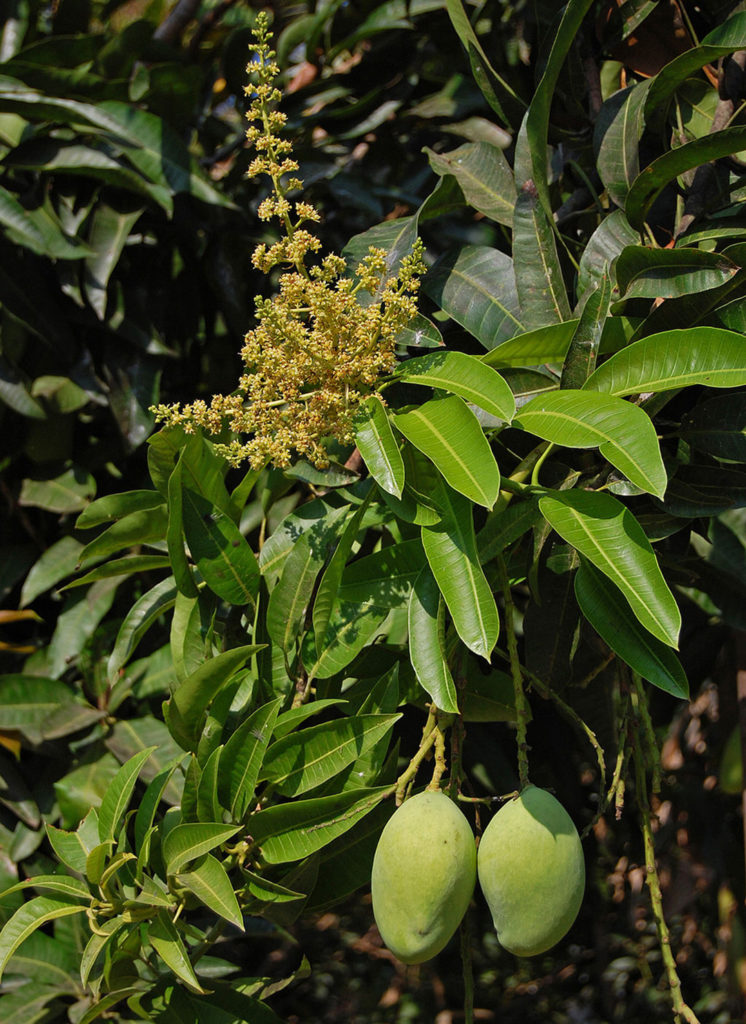
Haiti
Mango
Mangifera indica

General Description / Cultural Significance
The tropical mango fruit, Mangifera indica, grows all over the country of Haiti. Everyone enjoys eating it, and it is a number one export, with more than 100 varieties produced in the country as a source of income. It is also a vital source of sustenance, as Haiti has one of the highest rates of food insecurity in the world. Mangoes grow from May to October and can be smelled most distinctly then, when it is hot after long periods of rain. Mango trees are often similar to inheritances within Haitian families, planted around homes generations before to grow and bear fruit in the years to come.
Mango is one of the world’s most popular fruit, with green, red or yellow skin and fleshy sweet insides, often enjoyed fresh but also used in desserts and as flavoring. In Haiti, the shoots are sometimes boiled and drunk to ease digestion problems. Besides the fact that mango is nourishing, it is also considered to be an aphrodisiac. Scientific studies have also found that it possesses antiviral, anti-inflammatory, and antifungal properties.
Climate Change/Conservation Status
In January 2010, the worst earthquake in Haiti’s history occurred. After this natural disaster, an effort was made with the help of international public and private groups to rebuild the country’s mango industry. Significant progress was made; there were 10 million mango trees in Haiti and tens of thousands of mango farmers, most of whom were women, growing the uniquely long and flat fruit.
However, in October 2016, Haiti was devastated yet again, this time by Hurricane Matthew. Whole towns were wiped from the coast, and the majority of the mango trees and coconut palms were shredded or flattened in the catastrophe.
As of 2021, there are many programs attempting to plant mango trees and teach Haitian farmers how to grow them. Farmers are attempting to sell mangoes for fair prices to larger companies like Whole Foods, for example, in order improve their quality of life in the years after these devastating earthquakes. Mango farming is helping to increase the income of rural families specifically, so that they can afford food and school fees for their children. Haiti also suffers from severe deforestation, so each mango tree planted is incredibly valuable.
On August 14, 2021, a 7.2 magnitude earthquake hit Haiti. According to BBC more than 2,000 are dead and over 12,000 injured. The quake has devastated the country that never recovered from the catastrophic quake 11 years ago. Historically, Haiti has been vulnerable to hurricanes and droughts, but now climate change has made it prone to extreme weather events, exacerbating the country’s crisis. The earthquake was followed by Tropical Storm Grace bringing flooding to the regions most damaged by the quake. Rescue efforts and humanitarian aid is further complicated by the state of its government due to the assassination of its President on July 7th.
Alternate Names
Haitian mango
Francine mango
Madame Francis mango
Sources
A., A., 2017. How Mango Trees are Improving Lives in Haiti. Jane Goodall Institute. [website]
Attache for Ambassador, The Permanent Mission of Haiti to the United Nations. This statement can be found on the World Sensorium original website.
Barreto, A., et. al., 2009. Uses of medicinal plants by Haitian immigrants and their descendents in the province of Camagüey, Cuba. Journal of Ethnobiology and Ethnomedicine, [website] 5(16). DOI: 10.1186/1746-4269-5-16
Derese, S., 2017. Chapter 21: Mangifera indica L. (Anacardiaceae). Medicinal Spices and Vegetables from Africa, [website] pp. 451-483. DOI: 10.1016/B978-0-12-809286-6.00021-2
Obarowski, J., 2014. Four Years After the Earthquake, a Road to Market with Haitian Mangoes. TechnoServe. [website]
OPN, 2021. Four Seasons’ Fair Trade Organic Haitian Mango Program. Organic Produce Network. [website]
ORE, n.d. Mangos. Organization for the Rehabilitation of the Environment. [website]
USAID, 2021. Economic Growth and Agricultural Development. U.S. Agency of International Development. [website]
WFP, 2021. Haiti. World Food Programme. [website]

